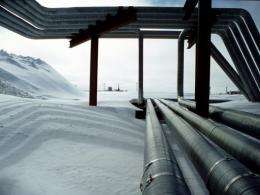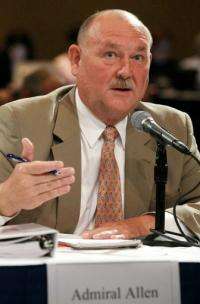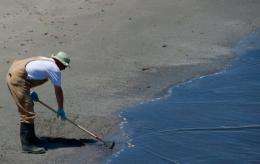US not ready for Arctic oil drilling, say officials

The United States is ill-equipped to deal with a major oil catastrophe in Alaska, the Coast Guard admiral who led the US response to the massive Gulf of Mexico oil spill and others have warned.
Only one of the US Coast Guard's three ice breakers is operational and would be available to respond to a disaster off Alaska's northern coast, which is icebound for much of the year, retired admiral Thad Allen told reporters this week.
Former Alaska lieutenant governor Fran Ulmer said that before drilling in the Arctic, the United States must "invest in the Coast Guard."
"It's not an option; it's a mandatory next step for our country to take," said Ulmer, who was a member of a presidential commission that last month called for more government oversight to prevent a repeat of the Gulf of Mexico disaster.
But funding for expensive new icebreakers is unlikely to be high on the list of priorities of Republicans who gained control of the House of Representatives by vowing to slash spending.
And yet, Republicans are likely to push for more drilling off Alaska's coast, an area rich in oil.
Allen drew a grim picture of the difficulties that would face authorities responding to an offshore emergency in the Arctic.
Hundreds of clean-up workers, spill investigators, counsellors and advisers poured into Louisiana after the Gulf of Mexico spill, taking over entire coastal towns.
But the town of Barrow, which is close to the offshore areas and where some rigs and offshore islands have already been erected, there are few facilities to house workers, let alone oil spill response crews or rescuers, he said.
"If you have 30 people, you've maxed out the beds," he said.

The town has no de-icing facilities and no hangar for fixed-wing aircraft, which were used extensively in the aftermath of the BP oil spill in the Gulf of Mexico.
"At this point the lack of a forward operating base would be a significant impediment not only to oil spill response but to search and rescue," said Allen.
Eleven rig workers died when a BP-leased rig exploded some 50 miles (80 kilometers) off the coast of Louisiana in April, sending a record 4.9 million barrels of toxic crude spewing into the Gulf before the gushing deepwater well was capped three months later.
The impact is still being felt in the region, where oil washed up on beaches, tainted fragile marshlands, caused the authorities to close down vast areas of water to commercial fishing and shrimping, and crippled tourism.
The oil spill panel that Ulmer sat on blamed the accident on "systemic" failures in oil industry safety practices and weak enforcement of safety rules and warned that without reform a disaster like that in the Gulf of Mexico might happen again.
Drilling in Alaska would be in shallower water than the BP well, but challenges including harsh weather, ice floes and the fact that the closest Coast Guard base is hundreds of miles away would make rescue and clean-up operations very difficult, said Marilyn Heijman, director of the Pew Environment Group's offshore energy reform and US Arctic campaigns.

In December, Interior Secretary Ken Salazar banned new drilling in the eastern Gulf and the Atlantic until beyond 2017, but said drilling in the Arctic could go ahead.
The one company that had applied for a permit to drill off the Alaska coast, Royal Dutch Shell, on Thursday said it was delaying the start of exploration because it has been unable to obtain permits.
The delay brought praise from environmental groups but criticism from Alaska politicians like Republican Governor Sean Parnell who said the delay was an example of the "federal government dragging its feet, killing jobs and making us even more reliant on oil from the Middle East and elsewhere."
Alaska Democratic Senator Mark Begich also railed at the government, saying it has "taken virtually every opportunity to block responsible development of Alaska's resources.
(c) 2011 AFP




















